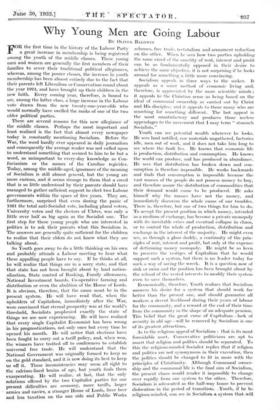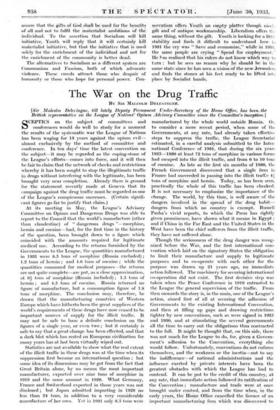Why Young Men are Going Labour
By OLIVER BALDWIN FOR the first time in the history of the Labour Party a great increase in membership is being registered among the youth of the middle classes. These young men and women are generally the first members of their families to sever their traditional political allegiances, whereas, among the poorer classes, the increase in youth membership has been almost entirely due to the fact that their parents left Liberalism or Conservatism round about the year 1924, and have brought up their children in the new faith. Every coming year, therefore, is bound to see,, among the latter class, a large increase in the Labour vote drawn from the new twenty-one-year-olds who would normally have swelled the ranks of one of the two older political parties.
. There are several reasons for this new allegiance of the middle classes. Perhaps the most important and least realized is the fact that almost every newspaper today is constantly mentioning Socialism. Before the War, the word hardly ever appeared in daily journalism and consequently the average reader was not called upon to understand something that seemed to him to be but a word, as unimportant to every-day knowledge as Con- fucianism or the names of the Caroline regicides. Today, among the middle-aged, ignorance of the meaning of Socialism is still almost general, but the young are more curious, and it seems strange to them that a creed that is so little understood by their parents should have managed to gather sufficient support to elect two Labour governments within the space of five years. They are, furthermore, surprised that even during the panic of -1931 the total anti-Socialist vote, including plural voters, University votes and the electors of Ulster, was only a little over half as big again as the Socialist one. The first step for these young people who are interested in politics is to ask their parents what this Socialism is. The answers are generally quite sufficient for the children to realize that their elders do not know what they are talking about.
So Youth goes away to do a little thinking on his own and probably attends a Labour meeting to hear what these appalling people have to say. If he thinks at all, he will realize that things are in a sorry state, and that that state has not been brought about by land nation- alization, State control of Banking, Family allowances, • National Investment boards, Co-operative farming and distribution or even the abolition of the House of Lords. It is obvious, therefore, that the cause must be in the present system. He will have read that, when the • upholders of Capitalism, immediately after the War, were convinced that eternal prosperity was at the world's threshold, Socialists prophesied exactly the state of things we are now experiencing. He will have realized that every single Capitalist Economist has been wrong in his prognostications, not only once, but every time he opened his mouth. He will notice that elections have been fought to carry out a tariff policy, and, when won, the winners have trotted off to conferences to establish universal free trade. He will understand that the National Government was originally formed to keep us on the gold standard, and it is now doing its best to keep us off it. These inconsistencies may seem all right to the calcium-lined brains of age, but youth finds them exasperating. He will realize, at last, that the only solutions offered by the two Capitalist parties for our present difficulties are economy, more tariffs, larger armies and navies, a stronger House of Lords, freer beer and less taxation on the one side and Public Works schemes, free trade, teetotalism and armament reduction on the other. When he sees how two parties upholding the same creed of the sanctity of rent, interest and profit can be so fundamentally opposed in their desire to achieve the same objective, it is not surprising if he looks around for something a little more convincing. Socialism appeals in three ways to the seeker. It appeals as a saner method of economic living and, therefore, is appreciated by the more scientific minds ; it appeals to the Christian sense as being based on the ideal of communal ownership as carried out by Christ and His disciples; and it appeals to those many who are searching for something different. The last appeal is the most unsatisfactory and produces those useless appendages to the movement that I may term "stomach Socialists."
Youth can see potential wealth wherever he looks. He sees land untilled, raw materials ungathered, factories idle, Men out of work, and it does not take him long to see where the fault lies. He knows that economic life is production, distribution and consumption. He knows the world can produce, and has produced in abundance. He sees that distribution has broken down and con- sumption is therefore impossible. He wOrks backwards • and finds that consumption is impossible because the vast masses of the people do not possess money to buy, and therefore assure the distribution of commodities that their demand would cause to be produced. He asks • himself why the masses -have not the money, and immediately discovers the whole cause of our troubles. There is, therefore, but one of two things for him to do. To accept the present position in which money, intended 'as a Medium of exchange, has become a private monopoly with its inevitable crises and eventual collapse in chaos, 'or to control the whole of production, distribution and exchange in the interest of the majority. He might. even • see, as through a glass darkly, a continuity of the prin- riples of rent, interest and profit, but only at the expense of dethroning money monopoly. He might be so keen to preserve the vestiges of Capitalism that he would -support such a system, but there is no leader today for -such a way of saving the wreck. It is a question now of sink or swim and the position has been brought about by .the refusal of the vested interests to modify their system even to save themselves.
.1 Economically, therefore, Youth realizes that Socialism answers his desire for a system that should work far better than the present one, and should guarantee all workers a decent livelihood (luring their years of labour for the community, and a reward at the end of their time from the community in the shape of an adequate pension. 'This belief that the great curse .of- Capitalism—lack of security in old age—will be removed by Socialism is one of its greatest attractions.
As to the religious appeal of Socialism : that is its most formidable asset. Conservative politicians arc apt to assert that religion and polities should be separated. To this the religious-minded Socialist replies that if religion and politics are not synonymous in their execution, then the politics should be changed to fit in more with the principles of Christianity. Although Communal owner- -ship and the communal life is the final aim of Socialism, the present chaos would render it impossible to change over rapidly -from one system- to the other.. Therefore, Socialism is advocated as the.half,way house to prevent dislocation, in 'the period of transitioW ..Youth, if he be religious-minded, can see in Socialism system:that will assure that the gifts.of GOckshall be used for the benefits of all and not to fulfil the materialist ambitions of the individual. To the assertion that Socialism will kill initiative, Youth . will reply that it will certainly kill materialist initiative, but that the initiative that is used solely for the enrichment of the individual and not for the enrichment of the community is better -dead.
The alternatives to Socialism as a different. system are Communism. and Fascism, both of which advocate violence. These creeds attract those who despair of humanity or those who hope for personal power. Con- servatism offers Youth an empty platter though nicely gilt and of antique workmanship. Liberalism ofrers tl same thing, without the gilt. Youth is looking for a little stability and finds it difficult to understand how in 1931 the cry was "Save and economize,' white in 1988, the same people are crying "Spend for. employment-." He Ims realized that his rulers do not know which way to turn but he sees no reason why he should- be in the Raille state since he has seen a visionof the new Jerusalem and finds the stones at his feet ready to- be lifted into place by Socialist hands.











































 Previous page
Previous page